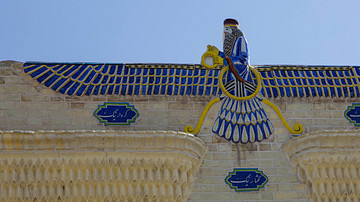Search
Search Results

Article
Religious Developments in Ancient India
For well over 1,000 years, sacred stories and heroic epics have made up the mythology of Hinduism. Nothing in these complex yet colourful legends is fixed and firm. Pulsing with creation, destruction, love, and war, it shifts and changes...

Collection
Mesopotamia: Government & Religion
The polytheistic religion of ancient Mesopotamia was instrumental in shaping its government and held great significance in the lives of its people. Mesopotamian religion revolved around the belief that humans were created to work alongside...

Collection
Aztec Religion & Culture
Aztec religion and culture flourished between c. 1345 and 1521 and, at its height, influenced the majority of the people of northern Mesoamerica. Great monarchs such as Montezuma imposed Aztec ideals across the area of modern-day Mexico...

Definition
Zarathustra
Zarathustra (also given as Zoroaster, Zartosht, Zarathustra Spitama, l. c. 1500-1000 BCE) was the Persian priest-turned-prophet who founded the religion of Zoroastrianism (also given as Mazdayasna “devotion to Mazda”), the first monotheistic...

Article
The Spread of Islam in Ancient Africa
Following the conquest of North Africa by Muslim Arabs in the 7th century CE, Islam spread throughout West Africa via merchants, traders, scholars, and missionaries, that is largely through peaceful means whereby African rulers either tolerated...

Image Gallery
A Gallery of Mesopotamian Religion
Mesopotamian religion was informed by the belief that humans were co-workers with the gods in maintaining the order created at the beginning of time and so religious expression was integral to daily life in ancient Mesopotamia in how they...
![Moabite Stone [Mesha Stele]](https://www.worldhistory.org/img/c/p/360x202/10037.jpg?v=1747932305)
Definition
Moabite Stone [Mesha Stele]
The Moabite Stone, otherwise known as the Mesha Stele, contains an ancient inscription by Mesha, King of Moab during the late 9th century BCE, elements of which match events in the Hebrew Bible. The inscription describes two aspects of how...

Collection
Maya Religion & Culture
Maya religion and culture is among the most advanced and sophisticated of the Pre-Colombian Americas as evidenced by the ruins of their great cities and what remains of their writings after most were burned by the Spanish in 1562. The Maya...

Definition
Ancient Celts
The ancient Celts were various tribal groups living in parts of western and central Europe in the Late Bronze Age and through the Iron Age (c. 700 BCE to c. 400 CE). Given the name Celts by ancient writers, these tribes and their culture...

Definition
Ancient Egypt
Egypt is a country in North Africa, on the Mediterranean Sea, and is home to one of the oldest civilizations on earth. The name 'Egypt' comes from the Greek Aegyptos which was the Greek pronunciation of the ancient Egyptian name 'Hwt-Ka-Ptah'...